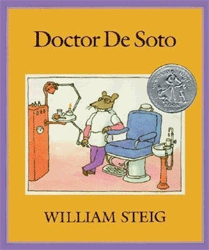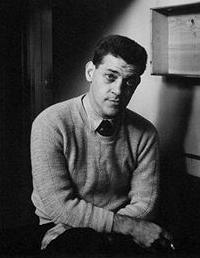A Year in Shorts Day 119: "Doctor DeSoto"
While not a household name like Dr. Seuss, the works of William Steig have provided some good fodder for Oscar-nominated films. And by that, I mostly mean Shrek, which won the first ever Academy Award for Best Animated Feature, and Shrek 2, which gave us an Oscar-nominated Counting Crows song. But nearly two decades before the release of Shrek there was another award-nominated film based on a book by William Steig- the 1984 short Doctor DeSoto.
As far as I can tell, Michael Sporn's animated adaptation of Doctor DeSoto is less of an adaptation of the book and more of a translation, with the text and visuals coming directly from the book. It's sort of like the BBC version of Pride & Prejudice in that way. There's certainly nothing wrong with this style of adaptation, especially not with a picture book; I remember having a VHS as a kid that had cartoon versions of Danny and the Dinosaur, Corduroy and one of the Madeleine books that I watched quite a bit. The only downside with making a short that way is that you're left with very little room for artistic expression. How good your film is depends mostly on how good the book you're adapting is.
And as far as these books go, Doctor DeSoto is pretty good. It tells the story of the eponymous doctor and his wife, who run a dentist practice for animals. Now I famously hate dentists, and let me tell you that this was not a short I particularly enjoyed watching two days before getting my wisdom teeth pulled out. Still, despite my distaste for dentists, I don't think they should be eaten, which is why the DeSotos have a rule against having dangerous animals as patients. They change their tune when a fox with a toothache comes to visit. What seems like the starting point for a story about how racism is bad and you shouldn't judge people by appearances... well, it isn't that. Maybe that's why this short only got nominated for an Oscar instead of winning it. Zootopia this ain't.
Rather bizarrely for a children's book there doesn't seem to be much of a moral, except for maybe "Don't try to betray people who help you" or "Suspect everyone who is capable of harming you is planning to". Not that kid's books need morals of course, but still. I don't think it's a classic, (although it won the National Book Award and was a Newberry Honor Book, so what the hell do I know?) but it's fine. William Steig's writing has a rather dry sense of humor, and his illustrations are nice to look at, if nothing spectacular. It's not a great story, but it's cute.
(via Wikipedia)
And that cuteness extends to the rest of the short too, with the charm of the story compensating for the limited animation and the oddly discordant score. Helping it along is the narration by Ian Thomson, who has a rather bizarre way of delivering things that manages to remain consistently engaging. It's not a great vocal performance, per se, but there's definitely something endearing about it nonetheless, as if he's a teacher who's not the best at reading to his students but he makes up for it with his enthusiasm. And honestly, that's the sort of energy this film needed. Shorts like this are mostly a way to watch a picture book come to life. And while Doctor DeSoto wouldn't top my list of books I necessarily need to see animated, it's still a perfectly pleasant story that's entertaining and (mostly) inoffensive. And it's one of the more obscure shorts we've covered here, so why not watch it and feel superior for having seen it? I think you'll have a good time.
I mean, aside from all the teeth stuff. I have to dock points for all the teeth stuff.
Keep up with the Oscar Baiting here on Letterboxd!
The Great Oscar Baiter is a not-for-profit work of criticism. All images herein are property of their respective owners and are protected under Fair Use.



Comments
Post a Comment